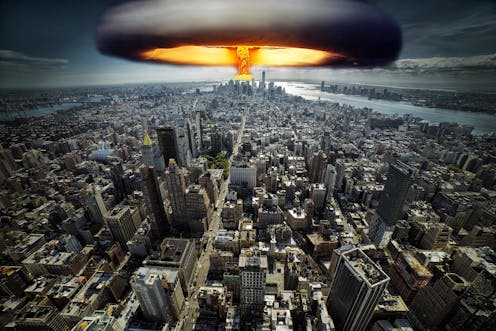Nuclear Experience

I spent six years in the frozen tundra. After graduating from tech school I spent some time at home in Arizona before embarking to the frozen wasteland of North Dakota. I arrived January 2, 2007 at 0100; I know it sounds obvious, but it was F-ING cold, something I would learn to embrace and hate equally over the years to come. My supervisor picked me up and I started my trek to the base in the middle of night with no light in sight.

If we fast-forward a few months, but still BNI—before nuclear incident—we encounter an eager version of myself, pumping out jets in phase and being crowned the Airman First Colonel of Hydro. Needless to say, I bled blue, loved planes, and wanted to learn everything I could. Hell, this was the golden time in my career, before the cocky SrA days or the smack down SSgt days. Basically, I was embracing my place in the system and enjoying the ride.
Minot was even a decent place BNI. I remember in the first six months I seemed to always have days off during the week for hard work, UTE days, or some other crazy reason. The locals were odd—a part of FTAC was being told that as a minority I would get stared at but not because locals hated me—but the nicest people. In the dead of winter people would go to the mall and leave cars unlocked and running while shopping. The level of trust was a must when the weather wanted to kill you eight months out of the year. Many will tell you the only two things to do in Minot is develop a drinking habit or make babies; you know, cause it is F-ING cold. All in all I was living the dream. The Air Force had lived up to my expectations and all was well.

Then came my first exercise.
I stood in roll call receiving the news surrounded by moans and groans. Being a baby airman I simply smiled and thought, “it can’t be that bad.” Guess what? It wasn’t! In fact, it is perhaps the only exercise that didn’t make me want to shoot myself—no I don’t need to see mental health it was a figure of speech—for special reasons.
First, the sight of it all kept me intrigued through the twelve-hour shifts. Watching BUFFs take true form, codes rolling, live nukes, and the number of personnel all working for one goal. It was amazing. I worked nights, which simply added to the thrill. Anyone who truly observes what happens during an exercise knows, as annoying as it is, the synced mission progression is exciting.
Second, I was on the inside. As a young airman I was flashing a badge, moving inside lines guarded by guns, and completing jobs to ensure warheads met foreheads. Some people were upset or whiney, but most seemed to be down with getting the job done and being part of the team. I think the idea of “live nuclear munitions” gave everyone a bit of a hard on.
Third, it was our world. I noticed that this level of power—nuclear weapons—wasn’t in the world of security forces, Special Forces, or such people; instead, it belonged to maintainers. In less time than one would expect—not sure if I want to put how long on the interwebs—we locked-and-loaded munitions on X number of jets, I promise, the number is powerful. We maintainers owned that shit. We, as a team, assembled the greatest device for destruction the world knows, and we loved it.
A few days later the exercise ended and after the index our commander came by the flight. He came by to give us some statistics that stuck with me over the last decade. I am sure to some it was just another speech taking up valuable sleeping/drinking time. To others, perhaps, it came across as absurd. However, it gave me chills and gave me a basis to always understand WHY I do what I do. He, a Major I will not name, informed us that during that short time of nuclear readiness on the ramp the order of “nuclear power” had changed. The United States was the number one nuclear power. China was the number two nuclear power. MINOT AFB was the third nuclear power. We, if separated from the union, could have raged war on the world. He went on to explain how Minot took that helm because of the hard work we maintainers put in during the exercise. The nuclear stance of Minot AFB is the beginning and end of deterrence, in my opinion.
Powerful.
I still remember the chills his speech ensued on my spine. I was part of the process, I was part of the deterrence, I was a GOD AMONG MEN! A little much? I think we all felt that at some point in our career. Maintenance is the backbone of the Air Force and it means we hold the power that bad guys fear. My first exposure to a nuclear exercise changed my life. Hell, it is the reason the BUFF will always be my love. No other aircraft can carry the load or power the way she can. I wish I could say that from there the adventure just went up. However, next was the NI—nuclear incident—and boy that opened its own bag of feelers about the Air Force.
Maybe next time.
Shop for more military products and gifts at these pages:
Challenge Coin Nation Morale Patches
Challenge Coin Nation Custom Morale Patches
Challenge Coin Nation Stock Morale Patches
Challenge Coin Nation Officially Retired Morale Patch
Challenge Coin Nation Challenge Coins















Leave a comment